Many new pet owners and allergy sufferers love to buy Poodles and bring them into their homes. Part of the reason is their major attribute, its single-layered, hypoallergenic coat. Unlike some dog breeds, the Poodle hardly ever sheds and has little dander trapped in their coat, as their hair just continues to grow. Due to its constant need to grow, you must groom its coat regularly if you plan on owning a Poodle.
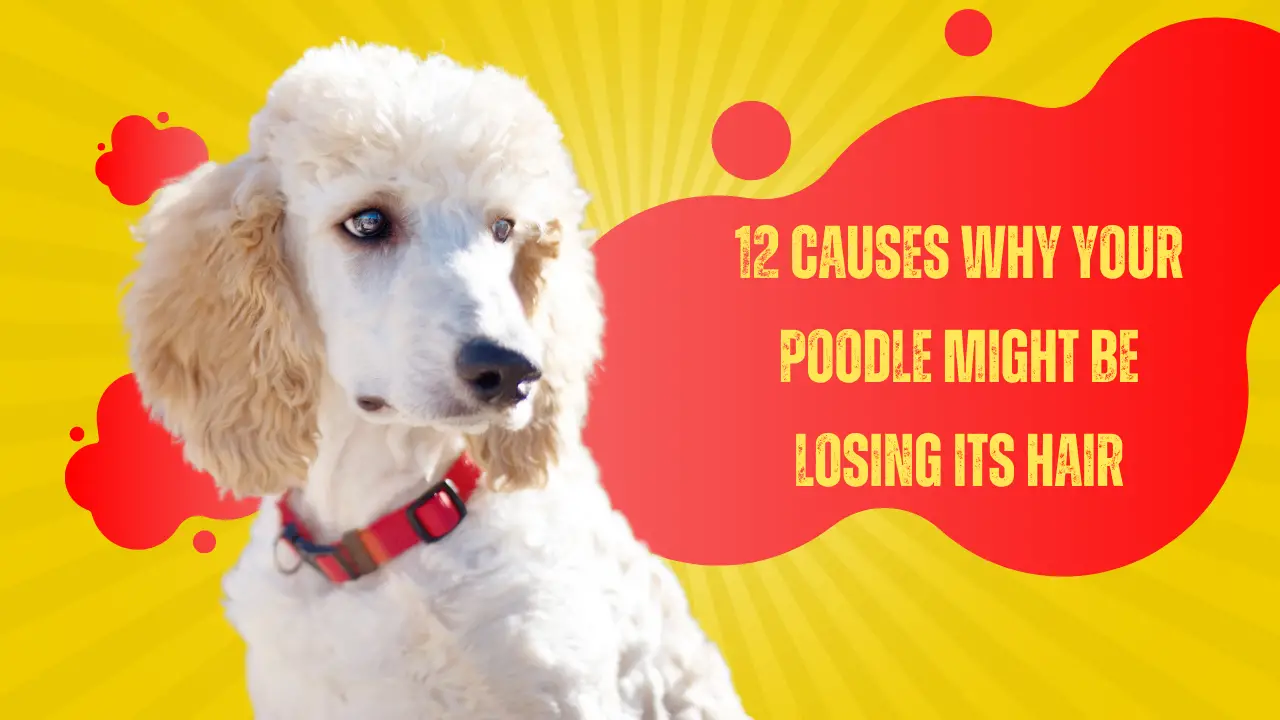
When grooming its coat, you must lookout for any mats, tats, dirt, debris, and more. Most importantly, you should check the consistency of their hair and ensure there are no bald patches in areas. After all, just like any other dog breed, Poodles are prone to specific problems like hair loss. Often, when they lose hair, it tends to be due to underlying health reasons that you or your vet must address.
Keep on reading to know more about the potential reasons why a Poodle could lose their hair.

Read our Smart Poodles - Smart Tricks eBook for only $2.99
Dive into a treasure trove of engaging tricks and tips designed specifically for your poodle!
What Will You Learn? 👇
Atopic Dermatitis
Many Poodles often experience atopic dermatitis at some point in their lives. Mainly though, it occurs in a Poodle between 1-3 years old. If you’re not familiar with this, it’s a condition that tends to be inherited from their parents. When Poodles are repeatedly exposed to an allergen like pollen, for example, it can cause them to have an allergic reaction. The typical of these allergic reactions are the following:
- Sneezing
- Runny nose
- Redness around their ears and stomach
- Hair loss
As hair loss can be one of the major symptoms of atopic dermatitis, you must look for other signs. More than likely, if a Poodle is suffering from this condition, they will experience it towards the end of summer when the pollen count is high. We also see atopic dermatitis due to e.g. dust mites (more prevalent in winter), food allergies (all year round), trees and molds.
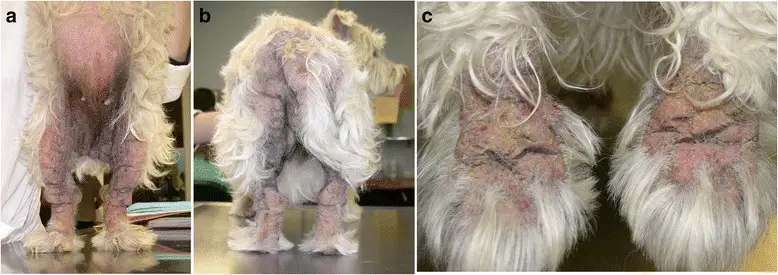
Given this, if you suspect a Poodle might be suffering from atopic dermatitis, you must take them to the vet for a regular check-up. In addition to viewing their symptoms, a vet might take skin scrapings to diagnose the condition.
While atopic dermatitis can contribute to hair loss, it does not cause Poodles that much pain, but it can cause intense irritation and lessens quality of life. Should the skin become infected (a common issue) or very inflamed, there will be pain present. But, if you suspect they do have it, you’ll want to watch out for them scratching badly, as it could trigger infections.
If the vet diagnoses your dog with atopic dermatitis, you must clean your house and Poodle thoroughly to remove any potential allergens that could trigger it.
Gender and hormones
Many female coats become thinner, and they lose a lot of hair when they are in heat. The same also applies when they are feeding their litter. In these circumstances, it’s normally their estrogen hormone that increases, and the more high levels in their body, the more likely the hair will thin out.
Sometimes a female Poodle’s hair may thin out so much that you might see her skin underneath. It’ll often look like patches of skin randomly occurring on her body. If this happens, it may take up to four months for their coat to grow back to its normal length.
But, usually, once the coat has grown back again, they will just be about to enter heat. If you don’t intend to breed your female Poodle, you should opt to have her spayed to reduce the risk of hormonal problems. After all, spaying can help balance hormones and cause less difficulty with their coat thinning.
Hypothyroidism
One underlying condition that could cause hair loss is hypothyroidism. This is when their thyroid gland does not produce enough hormones, causing a hormonal imbalance. Unlike atopic dermatitis, this is a severe condition that can contribute to many physiological changes and changes in a Poodle’s behavior. The main symptoms of this condition are lethargy, mental fatigue, hair loss, and bald spots.
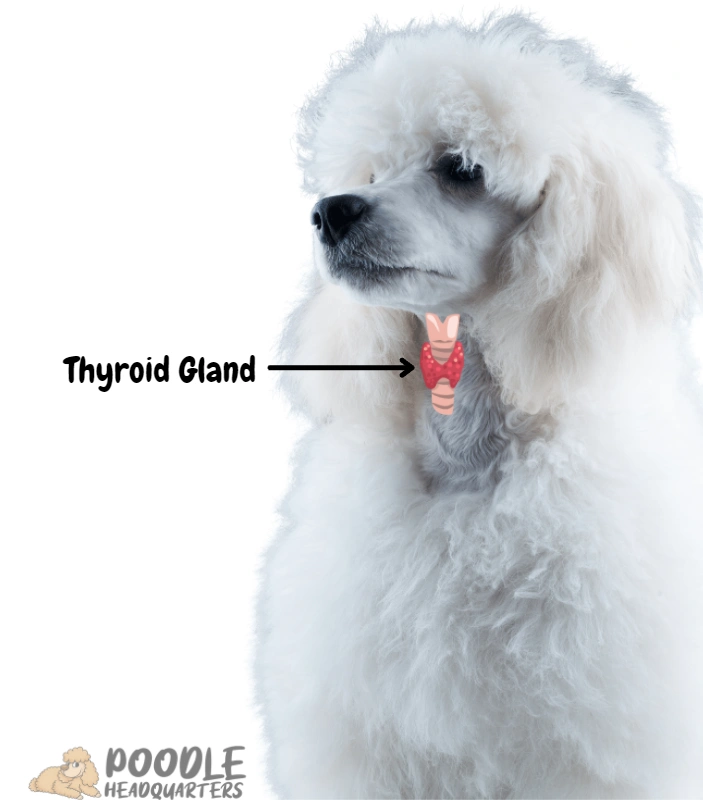
In addition to this, a Poodle might experience the following symptoms:
- Greasy skin
- Pimples
- Dandruff
- Brittle coat (hair thinning and frequent shedding)
If you notice any of these symptoms in a Poodle, you must immediately take them to a vet. A vet will help diagnose this condition by taking blood and urine samples from your Poodle. They must do this because your Poodle could gain a lot of weight and get bloated if they don’t. Once diagnosed, it’s likely the vet will give your dog hormone replacement therapy to help treat their hypothyroidism.
Alopecia
Miniature Poodles are often prone to suffering from a condition called Alopecia. This mainly occurs in Miniature male poodles when they enter adulthood. Alopecia can be triggered by ringworms, bacterial infections, mites, parasites, scratching, and more. It often coincides with flaky or itchy skin, and secondary skin infections are sometimes seen. This would cause itching, however, alopecia itself is not an itchy condition.
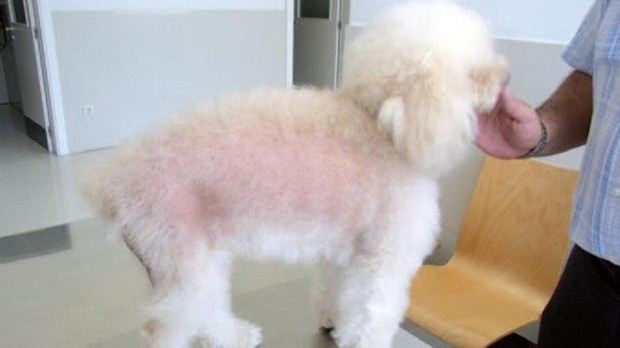
If you notice any of these symptoms, you must take your Poodle to the vet, who will diagnose them. A vet will likely take a skin scraping to confirm the diagnosis. Unlike other conditions, Alopecia is not severe and only affects their appearance.
Matted hair
Regardless of the type of Poodle you own, one problem that remains consistent amongst them all is matted hair. This happens very frequently when Poodles are puppies, as soon as they play outdoors, their hair becomes matted.
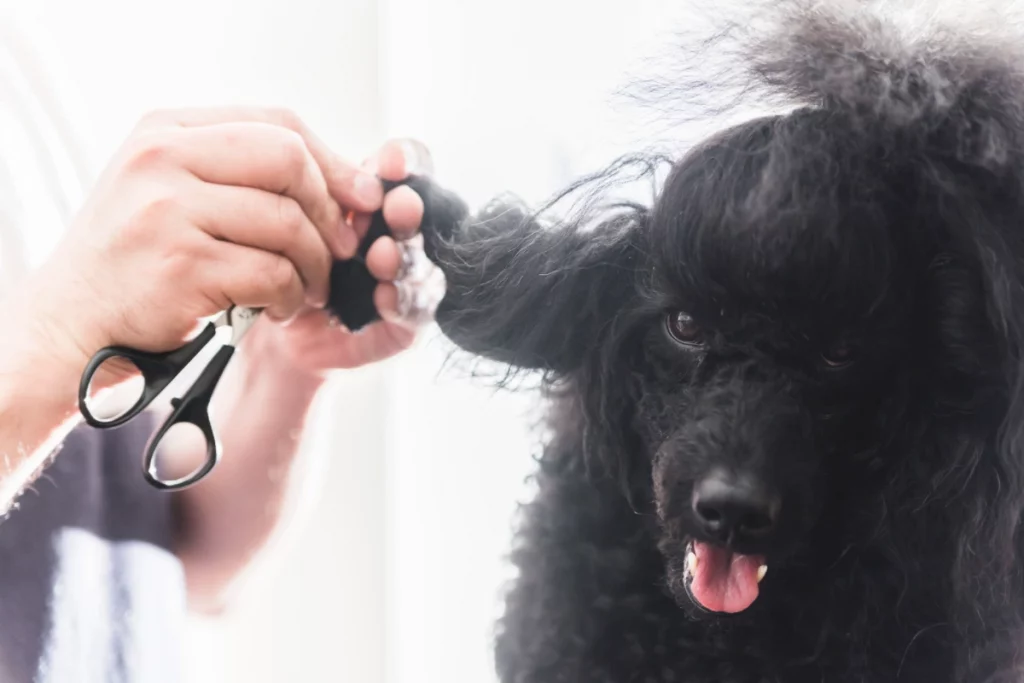
It can also easily get matted when it’s an adult and, as a result, start to fall out in clumps. To stop this from happening, you must groom your Poodle regularly and detangle its hair. You might even want to take it to a groomer to prevent this problem in the future.
Allergic reactions
If you find your Poodle has any underlying allergies, they could suffer from skin and hair loss. Poodles’ common allergies are mold, meat, cigarette smoke, poultry, cleaning products, wheat, grass, pollen and house dust mites.
Therefore because of this, it’s always a good idea to take your Poodle to the vet to undergo allergy tests. Once you know what allergens might cause their skin to itch and hair to fall out, you can put preventative measures to stop it. That could be using allergy-friendly detergent or removing grains from their diet.
Ringworm
Ringworm is a highly contagious fungal condition in Poodles that can cause hair loss in the shape of a ring. It’s mainly caused by three types of fungi and is highly condition for both humans and animals.
If you feel your Poodle might have it, you must take them to a vet immediately. If they diagnose ringworm, the Poodle will most likely be administered topical and oral medication. But most importantly, if they have it, you must desterilize every household object your Poodle has used.
Fleas, ticks, and mites
Usually, fleas, ticks, and mites are minor issues in Poodles. But, if your Poodle is infested with them, they may be irritated easily. As a result, your Poodle might scratch, bite and pull out its hair trying to get rid of them.
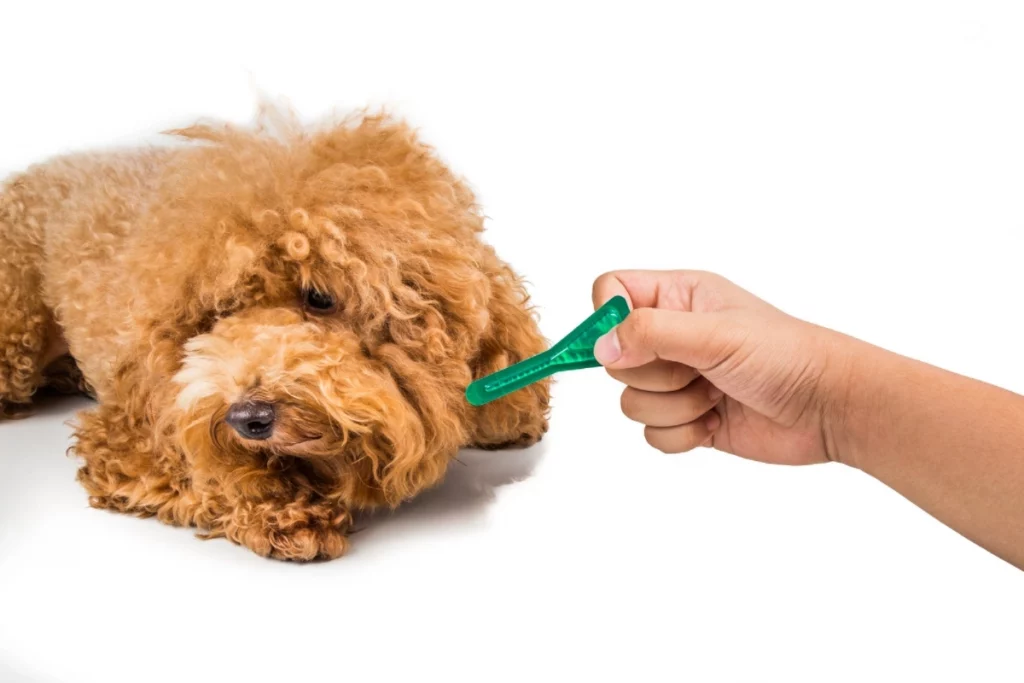
If it bothers them a great deal, they may draw blood from over scratching. You will want to use a flea or tick medication on them to prevent this. After some time of applying, if you notice your Poodle still irritated, you should take them to a vet.
Bacterial infection
When it comes to a Poodle losing their hair, it might actually be because of their skin. If your Poodle has a bacterial infection, it can stop their hair from growing.
At first, it might be difficult to notice this, though as Poodles tend to have thick and curly coats. Usually, the main sign of this is your Poodle scratching often and a strong odor coming from the infection. If you suspect your Poodle has a bacterial infection, you should take it to the vet, who will prescribe a course of antibiotics.
Overcurling
Be careful when bathing your Poodle, as if you don’t provide its coat good aftercare following their wash, they could lose hair. I mean by this, you should not let your Poodles coat dry naturally; instead, you should towel dry it. On the contrary, if you leave it to dry in the open air, it over curls and easily gets matted.
Split ends
If you brush your Poodles coat too much, you may create split ends in their hair, causing their hair to fall out. You should also avoid brushing their hair when wet as their hair can easily split this way. To stop their hair from falling out, you should try adding spray in the conditioner to make it smoother.
Top tip
- Try to buy dog conditioners that have PABA UV sunscreen in them. This is because these conditioners help protect your Poodle from UV radiation and supply its hair with a substantial amount of protein. Often the proteins in these conditioners help rebuild the bonds of each hair follicle and add body to thin coats.
Conclusion
Overall, Poodles are generally considered a dog breed suitable for allergy sufferers. Their single-layered coat does not shed much, and their hair often stays intact. If you own a Poodle and find them experiencing hair loss or bald patches, it could be due to various reasons. When observing their hair loss, you should also look for other symptoms as it could be an underlying health condition.
On the contrary, if you want to be proactive, you can incorporate simple steps like towel drying your Poodle’s hair or using a detangler to stop their hair from getting matted. But, if you still notice their hair is thinning, you should take them to see a vet.
Have you seen a Poodle losing hair? Share your experience with us.
Marko is the founder and author at PoodleHQ, where he blends profound expertise with formal training in Animal Behavior and Canine Genetics. With multiple generations of poodles under his care, he’s a breed connoisseur, honored with the Canine Care Excellence Award and lauded by the International Pet Enthusiasts Association.


Comments are closed.